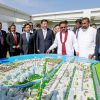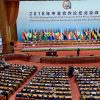Preface
This working paper is the result of a process of collective reflection in which many academics and diplomats –with whom I have had extraordinarily fruitful conversations in Brussels, Madrid, Pyongyang and Seoul– have participated. The contributions of those who responded to the policy Delphi that we launched in the spring of 2018, and of the participants in the seminar that we organised at the Brussels office of the Elcano Royal Institute on 5 October 2018, were especially valuable. I would therefore like to explicitly thank Alexander Zhebin, Axel Berkofsky, Bartosz Wisniewski, Charles Powell, Eric Ballbach, Félix Arteaga, Françoise Nicolas, Hideshi Tokuchi, Hiro Akutsu, John Nilsson-Wright, Kim Songyong, Lee Dongmin, Liu Qing, Luis Simón, Michael Paul, Mikael Weissman, Niklas Swanström, Ramón Pacheco, Shin Beomchul and Tariq Rauf for their contributions. I would also like to acknowledge the work of Elisa Lledó in organising the seminar and of Virginia Crespi de Valldaura in helping to prepare this paper.
I similarly want to thank the Korea Foundation for its generous support, without which this investigation would not have been possible.
The views expressed in this working paper are my own and do not necessarily reflect the position of any of the persons consulted, nor do they reflect the policy stance or the official position of any institution.
Introduction
The diplomatic situation in the Korean Peninsula is changing at enormous speed due to the conjunction of three factors: the rapid development of the North Korean nuclear programme under the leadership of Kim Jong-un, the election of Donald Trump as US President and that of Moon Jae-in as President of South Korea. In this context, this working paper analyses the position of the EU and its member states towards the current situation and the role they can play in the stabilisation of the Korean Peninsula.
The Democratic People’s Republic of Korea (DPRK) spectacularly developed its nuclear capacity in a very short space of time thanks to its byungjin doctrine, which focuses on the parallel development of the national economy and the nuclear programme. This development greatly alarmed the international community. The alarm was only heightened by Donald Trump’s election. His escalating exchange of heated rhetoric with Kim Jong-un and his coercive diplomacy notably increased the risk of military conflict on the Korean Peninsula. Indeed, to millions of Koreans and their neighbours, war seemed like a plausible scenario by the end of 2017.1
Nevertheless, the situation changed radically in the first months of 2018, when two parallel diplomatic processes involving North Korea were initiated. The first concerned South Korea and was aimed at seeking the reconciliation of the two states; the second concerned the US and sought to achieve denuclearisation and the pacification of the Korean Peninsula.
This increased use of diplomacy to tackle tensions in the Korean Peninsula was motivated by two factors.
First, the North Korean regime considered that the progress of its nuclear and missile programme in 2017 had provided it with a powerful and reliable deterrent against foreign intervention in its territory. Kim Jong-un himself proclaimed the success of the North Korean nuclear programme in his New Year’s Speech: ‘Our country’s nuclear forces are capable of thwarting and countering any nuclear threats from the US, and they constitute a powerful deterrent that prevents it from starting an adventurous war’.2 This position of strength allowed the North Korean regime to suspend its missile and nuclear tests, thus fulfilling a key prerequisite to enable the South Koreans and the Americans to engage in public negotiations with Pyongyang.
The second factor is that all three statesmen had strong incentives –mainly relating to their internal political aims– to embark in a negotiation process. Thanks to these diplomatic openings, Kim Jong-un has attained a level of international recognition that seemed impossible when he first succeeded his father. This has substantially strengthened his authority within the DPRK. Furthermore, the détente created by following this diplomatic route improves North Korea’s security situation while avoiding the threat of new sanctions and creating a propitious situation for current sanctions to be interpreted more laxly. This all favours the North Korean government’s current key objective: to focus on the economic development of the country.3 President Trump, on his part, has constantly tried to project an image of himself as an outstanding negotiator and to portray this as a key asset of his presidency. Nevertheless, his presidency has so far been characterised more by abandoning international treaties (including the TPP, the Paris Agreement on climate change, the Iran nuclear deal, and the Intermediate-Range Nuclear Forces Treaty) than by negotiating new ones. The North Korean nuclear and missiles programme gives him the opportunity to shine where his predecessors have failed.
In the case of President Moon, reconciliation with Pyongyang was one of the pillars of his electoral platform. This meant that part of his prestige would be at stake if he did not make progress in that direction. Instead, the inter-Korean reconciliation process, and especially the Panmunjom Summit of 27 April 2018, allowed Moon to reach the first anniversary of his mandate with an 83% approval rating –an especially significant result taking into account the unimpressive level of growth experienced by the South Korean economy in the period–. Such a level of popularity after only one year in power is unprecedented for any South Korean President.4
Despite the huge scepticism towards the possible outcome of the negotiations, there is international consensus on the convenience of promoting dialogue to dissipate the threat of war in the region.
The developments outlined above are of enormous importance due to their potential multiple consequences. They not only affect the future of all Korean citizens, but also the peace and security of the region and the globe, the international nuclear non-proliferation regime, Sino-US relations and the East Asian balance of power. As a result, the EU cannot afford to stay on the side-lines of these processes, even if it is undoubtedly going through serious internal difficulties and has other priorities on its foreign policy agenda. This working paper therefore presents a sober and realistic analysis of the role that the EU and some of its member states can play to contribute to the denuclearisation and inter-Korean reconciliation processes. It concludes that its role is secondary but significant. In addition, the paper presents a set of recommendations on how European involvement could materialise.
Mario Esteban
Senior Analyst, Elcano Royal Institute | @wizma9
1 Gallup International (2017); and USA Today (2017).
2 Kim Jong-un (2018).
3 This aim is stated in the resolution approved in the Third Plenum of the Central Committee of the Workers’ Party of Korea, ‘On concentrating all efforts on socialist economic construction to meet requirements of new high stage of developing revolution’.
4 USA Today (2018).



